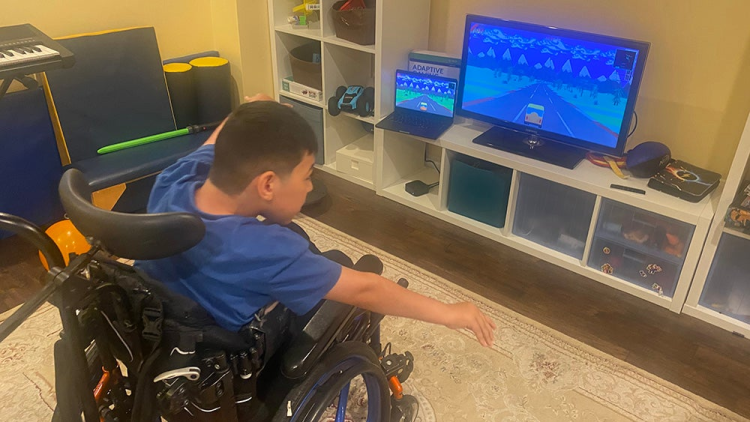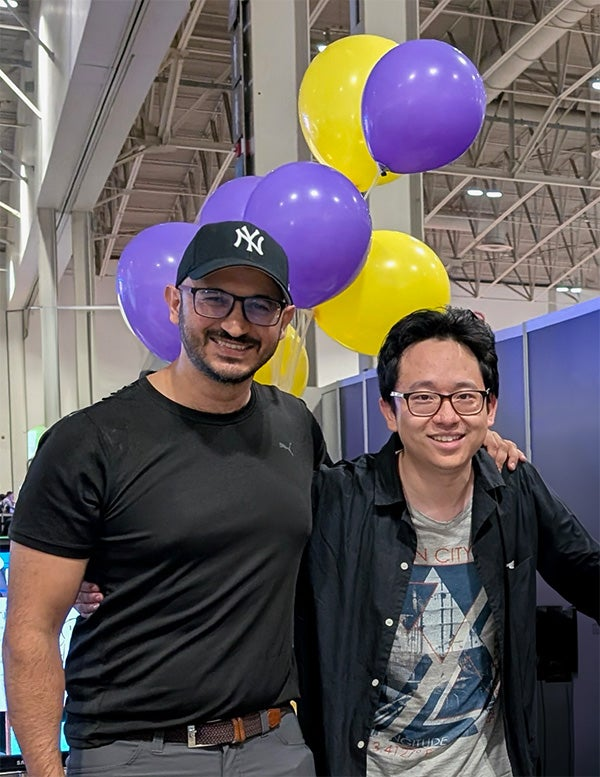What if your gym routine consisted of gliding across a forest, skewing fruits like a ninja, or racing on a Formula 1 track?
That's the vision behind Hiro, a Waterloo-based startup that is gamifying physiotherapy exercises for children with disabilities by including people with disabilities at the research's core.
Children with disabilities typically visit a physiotherapist and replicate their exercises at home to support their mobility. Unfortunately, some children may find these at-home activities challenging, leading to low motivation to complete them.

Hiro transforms physiotherapy into adventure-like games, in the comfort of the user's own home.
"These exercises can be boring, repetitive, and physically exhausting, when all kids want to do is play," says Hiro's co-founder Tamer Shahin. "We want to make physiotherapy more engaging, so the child is asking for it instead of seeing it as a chore."
The true hero behind Hiro is Shahin's nine-year-old son. He has cerebral palsy, a type of neuromuscular condition that affects motor or speech skills. Although his son works well with physical therapists, he often struggles with at-home exercises.
"Watching a young child fight through push-ups that even adults struggle with teaches you the real meaning of perseverance," Shahin says.
Like other parents, Shahin has tried to make these exercises more enjoyable by using toys, video games, and virtual reality headsets but with little success. Instead, he left his job as a startup advisor at Velocity and turned to academia by pursuing a master's degree at the University of Waterloo's David R. Cheriton School of Computer Science.
Shahin later met Jerry Chen (BASc '19), a computer engineering alum at an event hosted by Velocity, Waterloo's centre for entrepreneurship. Velocity has supported thousands of students and founders, leading to more than 500 companies that together exceed $40 billion in enterprise value.

Tamer Shahin (left) and Jerry Chen (right) at the Canadian National Exhibition. The duo co-founded Hiro, which transforms physiotherapy games into engaging games via AI.
Chen had previously co-founded brightmir.ai, a venture that develops video games for the blind or low vision community. By leveraging their experience Shahin's background at Velocity combined with his academic research, and Chen's expertise in software development and accessible games they co-founded Hiro.
Hiro cleverly blends typical physiotherapy exercises into imaginative and whimsical games. Take the T-pose, where you stretch your arms in a straight line, and then hold the pose. Hiro developed a game where the user is morphed into a bird and must fly over a forest by doing the T-pose.
The game prompts the player to explore the universe by trying different positions: to fly up, they must tilt sideways. To dive, they must press their palms together and point downwards. Through these subtle cues, the user will complete a typical at-home physiotherapy session without even realizing it.
A demo of one of Hiro's games, which blends stretching with flying!
It's bringing "fun" back into a child's life "which is a child's most important job," says Shahin.
The key to Hiro is machine learning models that can effectively capture a user's motion while working seamlessly with any smart camera, including phones, tablets or laptops. What's also central to Hiro is human-centred design.
"One of the core pieces that makes Hiro special is co-creating the games with the community itself. We centre our designs based on interviews and feedback from the community, including children and adults with disabilities, caregivers, or physiotherapists," Chen says.
The duo was able to learn these perspectives thanks to their partner, KidsAbility's Rocket Discovery Centre, KidsAbility's launchpad for innovation and research. KidsAbility Centre for Child Development provides pediatric rehabilitation services to more than 17,000 children and youth annually in the Region of Waterloo and Guelph-Wellington. They connected Hiro with various physiotherapists and families and provided a clinical space for Hiro to test and validate their prototypes.
In August, Hiro debuted at the Canadian National Exhibition (CNE).
"As soon as we arrived, the engagement was through the roof. What stood out to us was seeing people from different cultures, age groups, and families playing together to beat each other's high score," Chen says.
More than 200 participants visited Hiro's exhibit at the CNE.
Within a year, Hiro has transformed from a conversation between Shahin and his child's physiotherapist to a promising startup.
"Our partnership with KidsAbility started as a casual discussion with my son's therapist. Instantly, they rallied behind our idea and backed us with funding. Their support enabled us to reach families and therapists, learn what they care about, and build our technology around it. Obviously, we couldn't achieve such a partnership without my supervisor, Dr. Edith Law. As the co-director of Waterloo's Human Computer Interaction (HCI) Lab, she supported us by connecting us with innovative technology and research groups," Shahin says.
The startup is also supported by Velocity, most recently, completing their three-month Summer Accelerator program.
Hiro is expecting a public launch in March 2026. Currently, they are seeking families who can test out their prototypes and provide feedback.













